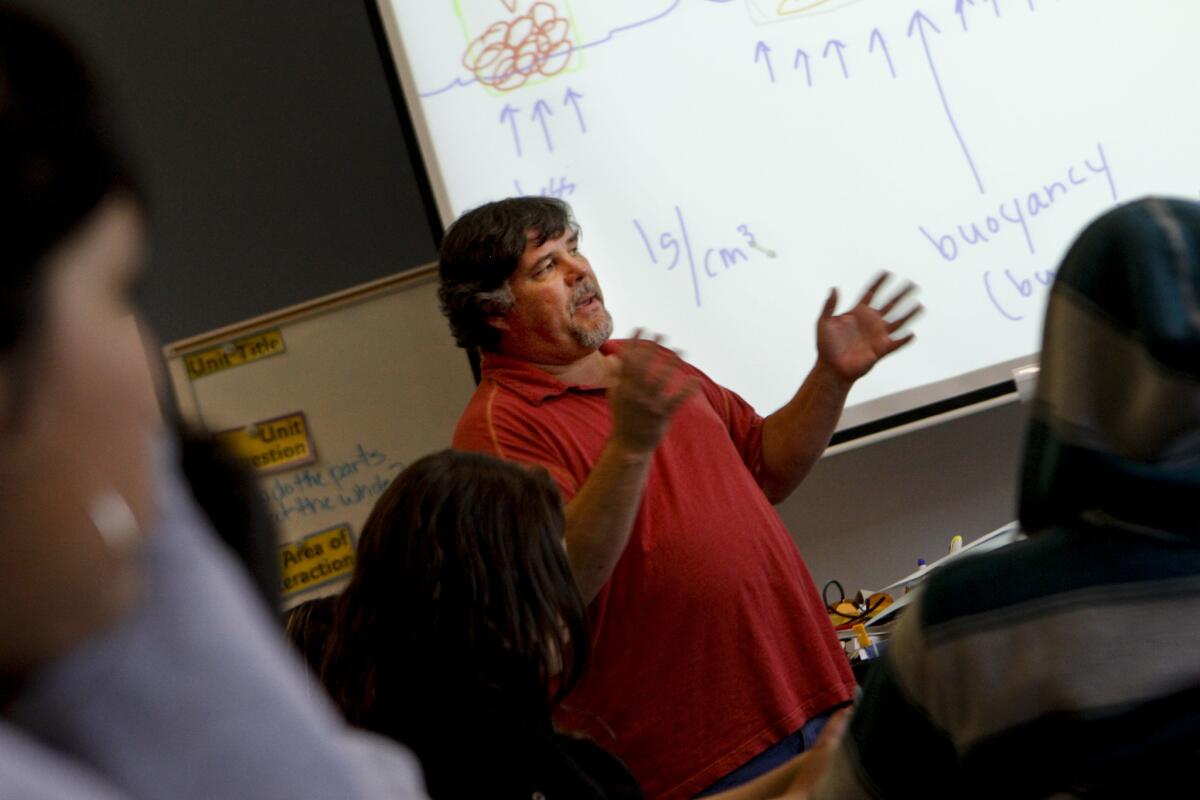Can collaboration between schools, unions fix failing campuses?

In 2011, Fedde Middle School faced a dilemma. The federal government was offering the struggling campus, located in the low-income and heavily immigrant city of Hawaiian Gardens, $1.5 million to help it improve. The catch was that the school had to use student test scores to evaluate teachers.
The use of student data in personnel matters has caused major divisions nationally between those seeking to measure teacher effectiveness and those who argue that test scores were designed to guide instruction, not evaluate jobs.
But Fedde administrators, the ABC Unified School District and teachers union representatives managed to avoid conflict by collaborating on a plan to use schoolwide test results, not those of individual students tied to specific teachers, in performance reviews.
Nationally, districts in Chicago, Cincinnati, Baltimore and elsewhere have shown gains in academic achievement after teachers and administrators developed strong partnerships.
Initiatives to foster these types of alliances are being supported by the American Federation of Teachers and the U.S. Department of Education, which has called labor-management collaboration “the most promising path to transforming American education.”
Along with the Ford Foundation, the teachers group and the federal government have helped fund workshops and research; California’s first statewide conference on collaboration is planned for early next year.
“I see a greater recognition across the country that this is a viable way to improve teaching and student performance,” said Saul A. Rubinstein, a Rutgers University professor who specializes in management and labor relations. “Collaboration shows results and it appeals to people instinctively.”
Not that it’s easy to achieve, especially in large urban districts faced with strong leaders and teachers unions battling over how to improve failing schools. In Chicago, Mayor Rahm Emanuel’s plan to close about 50 low-performing campuses — displacing teachers and staff — has drawn union ire as an attack on black neighborhoods, while the Philadelphia and Newark school systems are also embroiled in bitter conflict.
In L.A. Unified, former Supt. John Deasy resigned under pressure after sustained conflict with United Teachers Los Angeles over a host of issues, including efforts to limit teacher job protections and use student test scores in evaluations.
Deasy and Emanuel have argued that tough, quick action — even over union objections — is justified by the urgency of helping children in failing schools. Others have dismissed collaboration as a feel-good exercise that fails to deliver results. Michelle Rhee, former Washington, D.C., schools chancellor, famously said that “cooperation, collaboration and consensus-building are way overrated.”
But ABC Unified, which recently sponsored a conference with about 100 educators from other districts to promote collaboration, offers a different approach.
At Fedde, the approved plan was one on which everyone agreed: Each teacher would set a goal for student progress but would not be penalized for failing to reach it. Instead, coaching and other support would be offered.
The federal dollars helped pay for more tutoring and other services — and has kept the campus on a steady upward course. By 2013, Fedde had increased its score on the 1,000-point Academic Performance Index to 729, a gain of nearly 100 points over three years, outperforming 70% of schools with similar students.
Although the federal grant has ended, the collaboration continues; Principal Ricardo Lois and Ken Denman, the teachers union representative, hold weekly meetings. They recently forged agreement on a new policy on class visits.
“When you develop programs together, everyone puts forth more effort to make it work,” Denman said. “It all has to be done together.”
Mary Sieu, ABC Unified’s superintendent, said the experience demonstrates that struggling schools can improve without imposing controversial policies. Further, she said, the district’s progress shows that such outside efforts as charter schools aren’t needed. (There are no independently run charters in the district.)
“Across the country, we hear about the crisis schools are in; that schools are broken and not working. I’m sorry to say that’s not true,” Sieu said. “A lot of the tensions are the result of non-collaboration. The alternative model of labor-management partnership does work.”
Her assertion is supported by a recent Rutgers University study of ABC Unified, a district in Southeast Los Angeles operating 30 schools with 21,000 primarily Latino and Asian students, half of whom are low-income and about 1 in 5 is still learning English.
The study found that even in impoverished schools, strong partnerships can add as much as 76 points to a school’s API ranking, widely used as a measure of campus quality.
The study by Rubinstein and John E. McCarthy found that schools with more extensive collaboration on curriculum, teaching practices, mentorships and student performance data showed greater gains in academic progress.
Another study by the University of Chicago of 400 city schools over 15 years, from 1990 through 2005, found that campuses that improved the most had developed an unusually high degree of “relational trust” among staff.
Randi Weingarten, the American Federation of Teachers president, has said that collaboration is not a “silver bullet” but an essential tool to build trust, collective responsibility and public confidence in schools. She contrasts the collaborative approach to what she calls Deasy’s “top-down, my-way-or-the-highway, test-fixated approach.”
“Now there’s an opportunity here in L.A. for a real reset,” Weingarten said in an interview.
Steve Zimmer, a Board of Education member, said collaboration has already increased under Supt. Ramon Cortines, who succeeded Deasy. Although Deasy had “moments of great collaboration,” such as forging an educational reform group with eight other California school districts, Zimmer said, such unilateral actions as backing a lawsuit challenging teacher job protections and reorganizing Crenshaw High School contributed to hisdeparture.
Officials say that greater trust and collaboration don’t happen overnight. In ABC Unified, it took a bitter strike in 1993 for the union and administration to forge a new path. More recently, teachers and administrators in the Culver City Unified School District battled for years before developing a more harmonious relationship following the arrival of Supt. David LaRose in 2012.
David Mielke, president of Culver City’s teachers union, said LaRose regularly meets with teachers, widely shares information and develops most everything collaboratively, including budgets and district goals.
One shared goal, Mielke said, is to raise teacher salaries from the bottom quartile in L.A. County to above the median. Last year, the district and union were able to forge a new contract offering a 9.1% raise over three years, more generous benefits and a commitment to reopen the pact if more state funds arrive than projected.
“The change in bargaining has been absolutely dramatic,” Mielke said.
In ABC Unified, teachers and administrators managed to avoid layoffs during the recession that began in 2008 by agreeing to take furlough days and aggressively seeking outside funding.
Asked the biggest barrier to collaboration, Sieu was succinct: “Ego,” she said.
“Holding on to your titles requires you to be a certain way, but all of that has to shift,” she said. “You need to take your ego out of meetings. Partnership doesn’t mean letting go of power or becoming less of a leader.”
Twitter: @TeresaWatanabe
More to Read
Sign up for Essential California
The most important California stories and recommendations in your inbox every morning.
You may occasionally receive promotional content from the Los Angeles Times.











